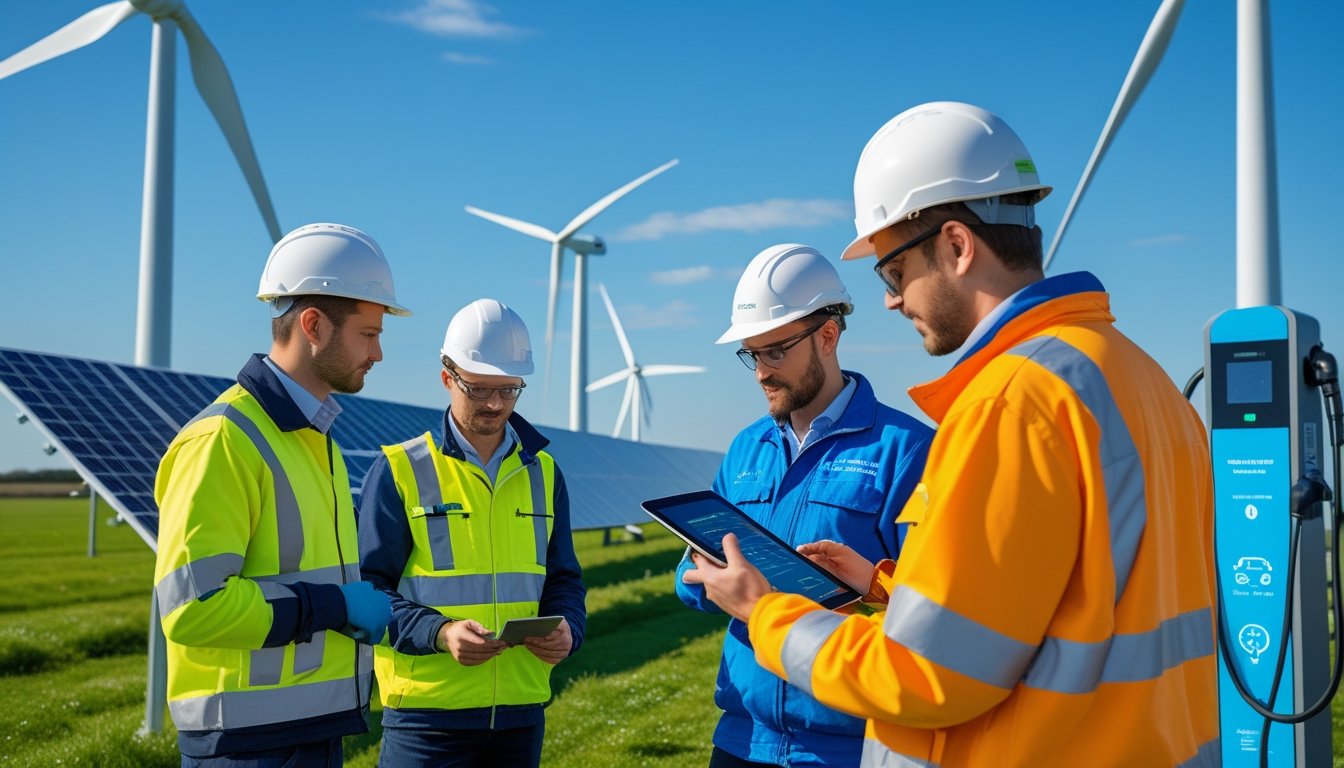Late updated: 22 Aug 2025 14:08
Written by: Eleanor Hartman
Exploring Renewable Energy Careers In The UK: Opportunities And Growth
The renewable energy sector in the UK presents an array of promising career opportunities. As a nation advancing towards sustainable energy solutions, new roles are emerging that cater to both technical and strategic aspects of energy conversion and supply. There are diverse paths for individuals from varied educational and professional backgrounds, ranging from engineering and project management to marketing and business development.

The demand for skilled professionals is rapidly increasing, driven by public demand, policy commitments, and technological advancements. Opportunities abound in solar, wind, and hydroelectric sectors, reflecting the UK's commitment to reducing carbon emissions and achieving net-zero targets. This dynamic environment not only offers new roles but also the chance for career progression in a field that's making a tangible impact on the world.
Our exploration of these career paths aims to provide insights into the necessary skills, training, and regional opportunities that abound within this sector. By delving into these elements, we hope to inspire interest and provide guidance to those considering a future in renewable energy.
Key Takeaways
- The UK renewable energy sector offers diverse career paths.
- High demand for skilled professionals across various disciplines.
- Essential skills and training lead to numerous opportunities.
Key Renewable Energy Career Paths In The UK

In the UK, renewable energy is booming. Careers are evolving rapidly as we gravitate towards a more sustainable future and aim for net-zero emissions. Let's explore pivotal career paths within this sector.
Careers In Wind Power
Wind power has become a cornerstone of the UK's renewable energy strategy, particularly offshore projects. Our professionals engage in roles such as wind turbine technicians, who install and maintain turbines, ensuring their efficiency.
Project managers oversee the development and execution of these projects. They manage resources, timelines, and ensure compliance with environmental standards. Technical skills and a keen understanding of regulatory requirements are essential for thriving in this area. The sector continues to expand as the government supports offshore wind farms to meet energy targets.
Opportunities In Solar Energy
Solar energy careers offer diverse roles, from technical to business-oriented positions. One prominent role is that of solar installers, responsible for setting up and maintaining photovoltaic systems. These jobs require technical expertise and precision to ensure optimal energy capture and efficiency.
Moreover, sales consultants play a significant role as they educate businesses and consumers about the benefits of solar energy. They help drive adoption and support the achievement of sustainability goals. Solar energy remains a growth area due to its declining costs and the UK's increasing investments in green technology.
Roles In Waste Management And Energy Efficiency
In the pursuit of energy efficiency, roles in waste management have grown substantially. These professionals design and implement strategies for energy recovery from waste materials. Engineers and consultants identify resource-efficient solutions, working to minimise waste while maximising energy extraction.
Energy efficiency analysts evaluate existing systems to identify areas for improvement, aiding businesses and communities in reducing energy consumption and costs. Greater awareness of environmental impact has boosted demand for these specialists. By focusing on efficient resource use, we contribute significantly to reaching energy targets and sustainability commitments.
Essential Skills, Training, And Regional Opportunities

In the UK's renewable energy sector, it's vital for us to equip ourselves with the right skills and training. We should also be aware of the regional job trends driving employment opportunities throughout the country.
Developing Green Skills For Renewable Jobs
To thrive in renewable energy roles, we need a robust understanding of key competencies, including technical expertise in solar, wind, and biomass systems. Technical skills like proficiency in software tools for energy management, and maintaining and operating renewable energy installations are essential. Additionally, understanding sustainability practices, such as life cycle assessment, and circular economy principles, can greatly contribute to success.
Furthermore, problem-solving abilities and innovation are critical as the industry constantly evolves. Interpersonal skills, communication, and leadership also play a role, especially in team-based projects. These skills not only enhance employability but also support the industry's move towards net-zero emissions.
Upskilling And Career Transitions
For those already in the workforce but seeking a transition into renewables, targeted upskilling is crucial. There are numerous educational resources available, from online courses in energy management to specialised graduate programmes. These offer flexibility for working professionals aiming to pivot to this sector.
Certifications in renewable energy technologies can substantially improve career prospects. Programmes like BTEC in Renewable Energy Engineering and City & Guilds Level 3 Renewable Energy are highly regarded. Pursuing continuous education demonstrates commitment and adaptability, making us more attractive to potential employers.
Networking events and industry conferences also provide opportunities to gain insights and make connections, which can be pivotal for those transitioning from traditional energy sectors.
Regional Trends In Renewable Energy Employment
Across different UK regions, the demand for renewable energy expertise varies. Scotland is a leader, notably in offshore wind projects, thanks to its natural resources. Wales concentrates on tidal and biomass energy solutions. In contrast, England sees a focus on solar projects, particularly in the south.
Each region presents unique opportunities and learning about local trends can guide us in seeking employment. Government initiatives, like the Green Jobs Taskforce, emphasise creating new roles to support net-zero targets. This regional knowledge enables us to align our skills with areas of high demand. Identifying these trends helps us target opportunities in regions with the greatest growth in renewables employment.
Frequently Asked Questions
In the UK's renewable energy sector, opportunities range from entry-level roles to high-paid specialist positions. For those seeking a career in this dynamic industry, understanding qualifications, salary expectations, and growth paths can provide a clearer picture of what to expect.
What qualifications are needed to start a career in renewable energy in the UK?
Qualifications vary depending on the role. Engineers typically require a degree in engineering or a related field. For consultancy and management roles, a background in business or environmental science can be advantageous. Vocational qualifications and certifications in renewable technologies are increasingly valued.
What is the average salary for renewable energy professionals across different roles in the UK?
Salaries can differ widely across roles. Typically, entry-level positions can start at around £20,000 to £30,000 annually. In contrast, experienced professionals, such as project managers and engineers, might earn between £40,000 and £70,000, depending on their experience and specialisation.
What are the high-paying career options available within the renewable energy sector?
High-paying careers often require specialised skills or substantial experience. Roles in project management, engineering, and consultancy can command higher salaries. Power systems engineers and renewable energy consultants are among the top earners, often earning more than £60,000 annually.
How can one enter the renewable energy industry without prior experience?
Starting in entry-level positions or apprenticeships can be an effective way to break into the industry. Volunteering, internships, or pursuing short courses in renewable technologies also enhance employability. Networking through industry events helps connect with professionals and uncover opportunities.
What are the various career progression paths in the UK's renewable energy field?
Career progression paths can vary significantly. Engineers might advance to senior technical roles or project management, while those in business development could move into strategic leadership positions. Continuous professional development and specialised training can accelerate career advancement.
What opportunities are available for renewable energy engineers in the UK job market?
The UK's growing focus on renewable energy creates numerous opportunities for engineers. Roles in wind, solar, and bioenergy projects are common. Engineers can work in design, implementation, and maintenance of renewable systems, contributing to innovative and sustainable energy solutions.